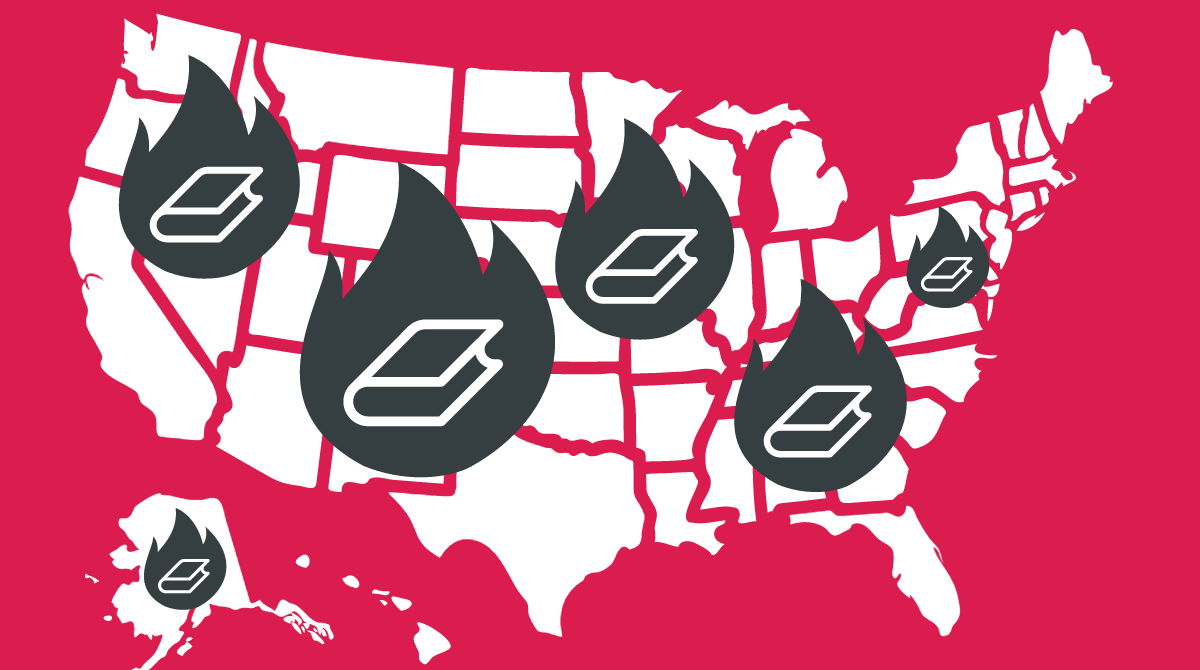Libraries and schools across the country are experiencing unprecedented levels of attempts to ban or remove books from their shelves. I Love Libraries will continue to raise awareness by highlighting attempts to censor library materials, as well as efforts by librarians, parents, students, and concerned citizens to push back against them. This report includes news from Iowa, New Mexico, Louisiana, and Vermont.
School district uses ChatGPT to help remove library books
An Iowa school district has used ChatGPT to identify books to remove from its shelves to comply with a statewide book ban, reports Popular Science.
Mason City Community School District removed 19 books from its libraries to comply with a recent book ban signed into law by Gov. Kim Reynolds. The law requires Iowa school library books to be “age appropriate” and without “descriptions or visual depictions of a sex act.” Bridgette Exman, Mason City’s Assistant Superintendent of Curriculum and Instruction, said the district compiled a list of books frequently banned for sexual content and asked ChatGPT, “Does [book] contain a description or depiction of a sex act?” If the chatbot answered yes, then “the book will be removed from circulation and stored.”
Exman argued it was “simply not feasible to read every book and filter for these new requirements.”
Calls for LGBTQ book ban in New Mexico seemingly backfire
An August 14 library board meeting in Rio Rancho, New Mexico, seemingly backfired on those calling for LGBTQ books to be banned in the main Rio Rancho Public Library, as most of the people who signed up for public comment were against banning books, reports KOB4. Signs in hand, many people showed up with a clear message: no book bans.
The city library board didn’t have book bans on its meeting agenda, but the turnout was in response to a tweet posted by the conservative group New Mexico Mass Resistance calling for followers to show up at the meeting to “defend the heterosexual nuclear family.” The tweet ended up having the opposite effect, however.
“We the people will continue to show up every time to make sure that we continue to have the freedom to read what we want to read, it’s important,” said one speaker at the meeting.
The plot thickens: The battle over books comes at a cost
“It’s something of a ‘new normal’ here – as it is around the nation. No longer are just books under fire, but also the library administrators, teachers and long-beloved librarians who are defending them. They’re being shouted down by parents, vilified on billboards, reported to the police, and trolled online, leaving many fearing for their safety,” reports NPR’s All Things Considered about the dangerous rhetoric and threats that librarians and library workers now face for standing up for the right to read.
“‘I had an actual death threat,’ says Livingston Parish (La.) school librarian Amanda Jones, her voice breaking as she recalls one particular post: ‘We know where you work + live….u have a LARGE target on ur back. Click… Click… See you soon.’
“Jones says it started after she spoke out at a library board meeting against censorship and ‘book policing.'”
Books banned in other states fuel Vermont lieutenant governor’s reading tour
David Zuckerman, Lieutenant Governor of Vermont, is currently on a statewide banned book reading tour at bookstores and libraries throughout the state, highlighting what he calls the importance of representation, free speech, open dialogue, and exchange of ideas, reports the Associated Press.
″These bans often target books that feature LGBTQ+ characters; talk about gender and sexuality; highlight racial disparities; or talk about difficult issues such as substance abuse and cases of police violence,” Zuckerman said in a statement when he announced the tour in June. “Students, teachers, and curious minds should be able to access materials that spark critical thinking, cover difficult topics, and appeal to diverse interests without fear of government interference.”
Zuckerman is reading from banned books at each stop and has been joined at certain stops by Vermont authors who are also reading segments from banned books.
Take action
Alarmed by the escalating attempts to censor books? Here are five steps you can take now to protect the freedom to read.
1. Follow news and social media in your community and state to keep apprised of organizations working to censor library or school materials.2. Show up for library workers at school or library board meetings and speak as a library advocate and community stakeholder who supports a parent’s right to restrict reading materials for their own child but not for all
3. Help provide a safety net for library professionals as they defend intellectual freedom in their communities by giving to the LeRoy C. Merritt Humanitarian Fund.
4. Educate friends, neighbors, and family members about censorship and how it harms communities. Share information from Banned Books Week.
5. Join the Unite Against Book Bans movement and visit our Fight Censorship page to learn what you can do to defend the freedom to read in your community.


